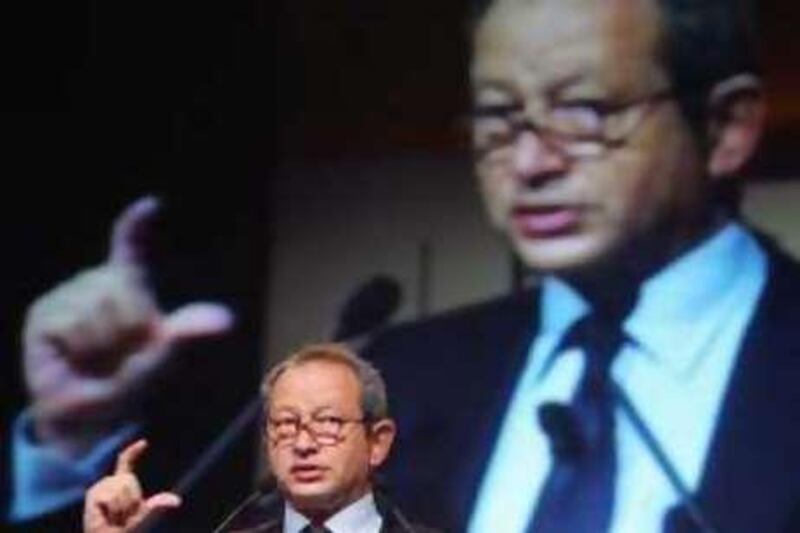Months of political instability in Pakistan and a storm of inter-related global events have taken their toll on Orascom Telecom (OT), which yesterday reported a 64 per cent plunge in quarterly earnings. OT, which is based in Cairo and one of the largest mobile operators in the Arab world, has previously enjoyed rapid growth in its businesses in Bangladesh and Pakistan, but poor results in both divisions hurt the company in the three months ending in June.
Their performance led the parent company to post a profit of US$80.6 million (Dh296m), less than half the figure expected by the investment bank EFG-Hermes in Cairo. In a conference call with analysts, Naguib Sawiris, the OT chairman, was philosophical about the confluence of economic events that hit the company. "Would you have predicted that world markets will crash and oil prices will rise and the president of Pakistan will leave and the Algerian government will issue a decree about investment?" he asked. "Only God could predict that."
Rising fuel prices cost the company $12m in Pakistan. The rises, caused in large part by a reduction in energy subsidies by the new government, were responsible for almost half the slip in profitability at OT's Pakistani business. With blackouts rolling across Karachi and other urban areas, the company relied more than usual on backup generators to power its network, increasing the weight of fuel prices in its overall expenses.
"Pakistan is becoming tough," said Shrouk Diab, an analyst at the investment bank Beltone Financial in Cairo. "I'm not that optimistic - it's a good market, but not as good as people are promoting it to be." "One of the major factors was worse than expected operating results in Pakistan and Bangladesh," said Marise Ananian, an analyst at EFG-Hermes. "In Pakistan, the political instability, high inflation and currency depreciation have put pressure on margins and earnings. In Bangladesh, the company reported a negative Ebitda [earnings before interest, depreciation, taxes and amortisation] due to the high connection tax that the government did not remove yet."
Analysts including Ms Ananian had expected a controversial sales tax on new mobile connections to be reduced or removed by the Bangladeshi government. The tax, which drags heavily on OT's bottom line in the booming market, remained, leading to worse than expected results at the Bangladeshi unit. The UAE's Etisalat, which competes with OT in Pakistan and Bangladesh, does not disclose performance figures for its overseas operations. But its second quarter results, released in July, were also impacted by worse than expected performances in its international units.
Ms Diab said OT's fundamental performance in revenue and subscriber figures remained strong, although possibly not strong enough to please growth-focused investors. "I've been saying for the past year that Orascom is no longer a growth story," she said. "It is starting to mature, but analysts are still expecting more growth." Shares in OT, traded on the Cairo & Alexandria Stock Exchange, dropped by eight per cent yesterday following the results announcement. The shares have lost 45 per cent so far this year. Orascom's woes extended to its traditional home base of North Africa.
Disagreements with the Algerian government and telecommunications regulator led the company to write-down much of the value of its fixed-line licence there, leading to an unexpected $30m hit. Financing costs at the emerging market operator ballooned from $297m in the first half of last year to almost $1.6 billion in the six months to June this year. Much of this can be attributed to the cost of acquiring a new 3G telecommunications licence for Mobinil, its flagship Egyptian network.
OT also used debt to buy back more than 120 million of its own shares, contributing to the increased finance costs for the quarter. Mr Sawiris, OT's founder and the richest man in Egypt, said the company would continue to invest heavily in risky emerging markets as it sought to gain new customers. "You can wait and have better numbers across the years, or you can decide 'no, I want the growth today, because if I wait, my competitor is going to take it'," he said. "We believe in the importance of becoming the dominant player and taking market share. That's the policy, and we won't deviate because it is what has brought us success."
tgara@thenational.ae
Orascom quarterly profit plunges 64%
Months of political instability in Pakistan and inter-related global events have taken their toll on Orascom Telecom.

Editor's picks
More from the national




